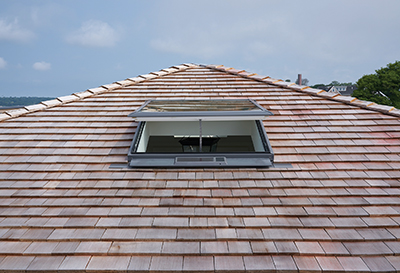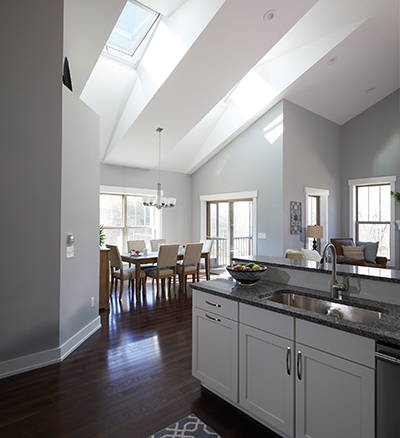
Healthy at Home
How to improve indoor airflow and quality
More efficient, tightly built homes than those constructed in previous generations are generally well-regarded, for the most part with good reason. However, when you consider people spend 90 percent of their time indoors on average, according to the Environmental Protection Agency (EPA), such airtight environments raise some concerns.

All that efficiency cuts down on airflow, effectively trapping allergens and toxins inside. According to estimates from the EPA, the air inside the average home may be as much as five times more polluted than the air outdoors, even in a bustling city.
“We know instinctively that spending so many hours in stuffy places isn’t good for us,” said Peter Foldbjerg, head of daylight energy and indoor climate at Velux. “According to research, living in damp and moldy homes increases our risk of asthma by 40 percent and leaves us vulnerable to developing other ailments.”
Limited fresh air and light during the day can negatively impact mood, sleep and performance. Air pollution can also pose a health risk through irritation to the eyes, nose and throat; headaches, dizziness and fatigue; and respiratory conditions, heart disease and cancer. To help alleviate some of these concerns, consider these tips.
Bring the outside in.
Even a small step like adding some potted plants, which are known to purify air, can improve your indoor environment. In addition, think of how you could create a better view to the outside through smart use of windows and doors that bring in fresh air and daylight.
Rely on natural air flow.
Open your windows 3-4 times a day, at least 10 minutes at a time, to allow fresh air in. To complement natural light and fresh air from vertical windows, consider adding skylights to rooms you use most often. Skylights that can be opened, such as those offered by Velux, contribute to greater indoor comfort and ventilation by removing excess heat, moisture, odors and other indoor pollutants. They can also help reduce the need for air-conditioning due to the chimney effect, which occurs when skylights and vertical windows are both opened, allowing warm, stale air to rise and escape through the roof, replaced by fresh air drawn in through traditional windows.
Eliminate potential obstacles.
Avoid blocking fresh air with drapes, blinds and other hindrances, like heavy furniture placed too close to windows. Also consider other aspects of your home that could be thwarting your efforts to improve air circulation and quality, such as dust, dirt and mold. Regular and thorough cleaning can help keep those irritants at bay and make your quest for cleaner air easier.

Creating Cleaner Indoor Air
Creating more airflow is an important step to improving your indoor environment, but considerations like air quality should not be overlooked. More air is a good thing, but more clean air is better yet.
Everyday home life activities such as cooking, showering, lighting candles, sleeping and doing laundry can all contribute to polluted indoor air, which over time can lead to the development of illnesses.
These tips from the indoor climate experts at Velux can help make the air inside your home healthier:
1. Keep bathroom doors closed and turn on the extractor fan or open a window or skylight when showering.
2. Turn the hood fan on when cooking and open your windows, if weather permits.
3. Avoid burning candles excessively; look for alternatives such as sprigs of lavender to add a natural fresh scent.
4. Dry clothes outside when possible, which reduces carbon emissions from the dryer and minimizes potential pollutants traveling through the dryer vent.
5. Clean regularly with non-chemical based cleaning products, and pay attention to ingredients in cleaning products that may create hazardous fumes.
Increasing Natural Light
Sunlight is a natural antidepressant, and there is ample scientific evidence that associates daylight with better health and quality of life, such as improved mood, less fatigue and reduced eye strain. If your home needs some brightening up, consider these home features with natural light in mind:
Paint
Choosing a lighter-colored paint and avoiding statement wallpaper or large blocks of color can naturally make a space feel brighter and reflect any natural light entering the room. Think soft shades of off-white or subdued, neutral hues.
Flooring
Wooden, ceramic or stone floors with a polished finish typically reflect light to help brighten spaces. If you prefer carpet, consider light, neutral colors to help make the space feel brighter.
Skylights
Adding skylights is a relatively low-cost, high-impact home improvement that can enhance home decor and deliver energy-saving benefits, as well. Fresh air skylights, like those from Velux, can help reduce dependence on artificial lighting and mechanical ventilation, which helps save money on electric bills. Convenience features like remote control operation make it easy to manage air flow and natural lighting with the touch of a button.
Mirrors
Adding furniture and accessories with reflective surfaces can help diffuse light and add stylish touches throughout the home. Metallic, glass and mirrored accessories, or even mirrors themselves, can spread light throughout your home.
Lighting
Go easy on artificial lighting, and instead work to optimize natural light sources. Consider supplementing areas where natural light doesn’t reach such as corners and corridors with small lamps, and install dimmer switches that can easily be adjusted depending on the amount of natural light flowing into your home.
Find more tips for creating a healthier home at veluxusa.com/indoorgeneration.
Source:
Velux
Media











